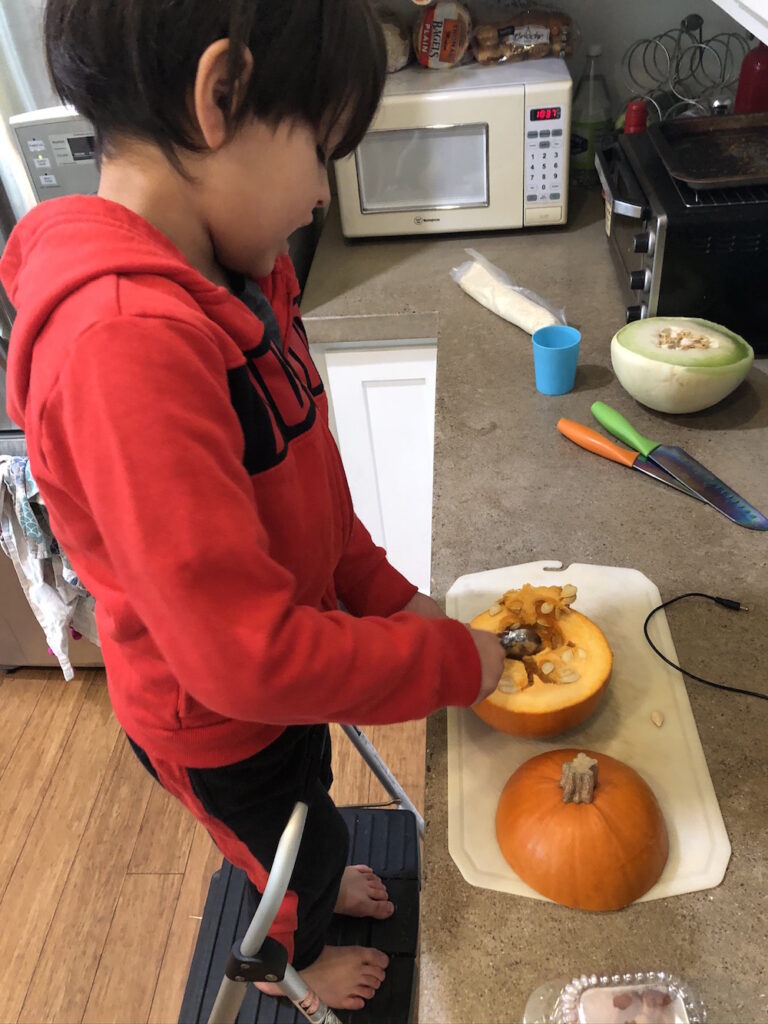In Praise of Complaining
I’m generally not one to complain, began a post in a local moms’ group, but this morning I’m kind of done.
She went on to describe the elaborate Halloween costume she’d made her 10-year-old, only to witness her daughter erupt in tears when her makeup didn’t turn out right. In the comments, moms commiserated and sent virtual hugs, and I wrote, I generally am one to complain. I find it helps a lot.
“Kvetch” means “to complain” or “to whine” in Yiddish. I’m only a quarter Jewish, but my face and hair don’t know this. When I was a student at UCLA years ago, rabbis used to stop me on campus and invite me to Shabbat dinners; that’s how Jewish I look. My brain appears to be stereotypically Jewish too: I’m neurotic, anxious, and guilt-ridden. And I can kvetch with the best of them.
Since March, my spouse and I have worked from home while caring for our kindergartner, Dash, and, for several hours most days, the two girls next door. During those months, my dad struggled to recover from surgery; we said goodbye to a baby we wanted to adopt; our country splintered over the question of whether police should be allowed to kill Black people; the sky turned a strange, opaque white as fires ripped through California; my aunt died suddenly; and my partner’s mom had a stroke.
This year has given me plenty of fodder, even as it has reiterated just how privileged I am. I didn’t lose my job. None of my family members or local friends have gotten COVID (knockonwood). We have a good place to live. And even though I feel like my head will explode the next time a child says she doesn’t like “sprinkle cheese” (i.e. grated cheese, which will melt into non-grated cheese once I bake the fucking pizza), I can always order the preferred cheese online and it will show up on my porch in a few hours.
Kvetching, for me, holds this tension between injustice and privilege, good luck and bad. There is, of course, a nobler kind of complaining. Four years of protesting, organizing, and advocating helped end the reign of the King Of All Whiners (“But voter fraud!”). Finally. From slave uprisings to allegorical nursery rhymes, history is written by complainers. But I’m interested in a kind of complaining that is not the shamey-blamey variety perpetuated by our current lame duck or legit righteous outrage.

MUTHA writer Minna Dubin has written about #MomRage: “Between stay-at-home orders, COVID-19 health concerns, financial instability (or fear of it), and police violence against Black people, it is no surprise that mothers are experiencing intensified rage above the surface, and feelings of grief, fear, and loneliness below,” she wrote in the New York Times.
What do you do when there’s no immediate antidote to any of it in sight? You hold space. You complain. Or at least, I do.
On a recent visit to my dad’s house, we sat on his patio–because COVID–as the November wind stabbed icy fingers through our subpar Southern California jackets. With a yellow plastic excavator, Dash dug holes between wind-whipped flowers.
“I have to go potty!” he announced. You might think that after eight months of never being apart for more than a few hours, he’d want some alone time, but “I want to go potty with you,” he said.
“I think you can do this on your own,” I said without much hope. “You know where the bathroom is.”
“Okay, I’m going by myself!”
To my surprise, he disappeared inside the house. He reappeared on the second-floor deck over our heads.
“I’m doing an experiment,” he called. A series of McDonald’s toys sailed past my head and clattered to the bricks.
“Well, now you know what happens when you throw your toys over the railing.”
He reappeared downstairs. “I have to go potty.”
“I thought you just went. You didn’t, did you?”
“I did! I went pee. Now I want to go poop with you.”
I looked at my dad. “All day. ALL DAY!”
My dad was in the circle of people who listened to me complain for four and a half years about not having a child. Now I felt compelled to clarify what he, having co-raised two children, already knew: “It’s not that I don’t like being a parent. It’s just that there’s nothing on this earth I want to do for sixteen hours a day.”

My complaining is frequently of the “it’s just that” variety. Sometimes I wonder if I’m perpetually unsatisfied with life. It’s not a good look. I like parenting, it’s just that I want to do other things too. I love my partner, it’s just that she can’t cook pasta without using ten pans. I like my boss, it’s just that she always has so many ideas and a lot of them involve more work for me.
I followed Dash around my dad’s driveway, trying not to trip over plastic trucks as I texted a group of writer-moms. Our daily check-ins are usually complaints, peppered with tiny triumphs and the hashtag #NoOneCares. Both parenting and writing are long-haul endeavors dependent on details that may not pay off for years.
I’ve been irritable all afternoon for no particular reason other than the fact that children are demanding and insatiable and if you make pumpkin pie with them and do a treasure hunt for them they just get upset that you didn’t do two treasure hunts for them.
Jennifer replied: You get a [trophy emoji] from me for making pumpkin pie from scratch! (I did use an actual pumpkin, but I didn’t make the crust. I’m not crazy.)
A few months ago, Shea, another member of the group, sent us all actual trophies, the perfect size to hold in our hands, emblazoned with our names and the words PANDEMIC PARTICIPANT.

My partner has never liked how hung up I am on getting credit. I don’t love it either–my own insatiability and treasure hunting, my need for gold stars and good grades. When I complain, she sometimes grumbles that I’m “playing the victim,” taking life’s inevitable bumps as grand injustices. Maybe because I set the bar so stupidly high, I need the world to know why I’m not accomplishing more.
It’s because as I was writing this piece, the smoke alarm went off and then Dash insisted on sitting next to me and playing a math game on my phone.
It’s because yesterday I had to help Dash and Jasmine with their homework at the same time, while my boss was G-chatting me about the wording of a fundraising mailer.
It’s because our president is a psychopath and I haven’t hugged my dad or sister in eight months and our heater is broken and the space in my brain that might have been occupied by great novels or films is filled with episodes of Peppa Pig. Do do-do do do, do-do do-do do do.
By speaking these realities, I’m doing a kind of biopsy of the situation. It’s compulsive and annoying, but it allows me to see which pieces might need to shift in order for me to push toward my elusive goals or even…happiness. (Did I just imply that my child is a tumor to be removed? He is not. I had a tumor once, and Dash is much, much cuter.)
My dad is half Jewish. His father was a Jew who became a priest in the Liberal Catholic church and died when my dad was still learning to walk. He was raised by his British mother, with help from her parents, who believed children shouldn’t talk too much. My dad talked anyway, and got sent to his room a lot.
Now, at 77, he’s still stiff from his spinal surgery in February. As the wind cooled our mugs of tea, he pulled on a thick flannel shirt and fumbled with the buttons.
“My left hand still has so much neuropathy, and I can’t bend my neck far enough to see what I’m doing,” he said. “But it beats being quadriplegic.”
He also sometimes says, re: our family phone plan, “We went over our data last month, but it’s okay.” We are a family of people who can never not say things, but we’re also compelled to punctuate our complaints with a reiteration that things are fine. Which they are. And aren’t. And are. When I had breast cancer in 2012, I sobbed and raged and, in the same breath, cited my good health insurance and supportive family. As a writer and as a human being, I want to describe the whole picture, always.
One of the marks of totalitarianism–according to the checklists circulating on the internet since 2016–is an acceptance of horror. Shock is, by definition, not a sustainable emotion. Complaining about the big and small things is a way of saying, I’m alive, but things could be better, and maybe someday they will be. In the meantime, please bear witness to the buffet of snack foods ground into my couch.
I will shelter in place. I will care for kids who don’t belong to me. I will put together mailing lists even though mailing lists are not in my job description. I will go the extra mile, but I will moan about it every step. To complain is to insist on being seen.

One of my favorite songs is “True North,” by a Jewish punk band called The Shondes. (Again, my Jewish-adjacence: My sacred texts are lyrics by a band I learned about on a mom podcast, The Double Shift.) The song includes these lines:
When we say “next year in Jerusalem”
We say “every day is revolution”
We raise the torch, we face true North
The phrase “Next year in Jerusalem”–part of the Passover seder as well as indie punk songs–holds space for what feels impossible in the moment. Hope is a cousin of complaint, and if you look at their complexity, that’s where you see the family resemblance. I’m not saying that speaking out against racism is the same as speaking out against the trail of rocks Dash brought in from the backyard. At all. Just that life is struggle, and it’s okay to say so.
When I set about cleaning up the rocks last night, pebble by pebble, Dash complained that I was blocking the TV.
“I can’t see Peppa!”
I try not to guilt him, the way my (non-Jewish) mom so often guilted me before assuring me that it was all fine. I try, but I fail.
“Dash. I cleaned up after you guys a lot today, and it makes me feel tired when you don’t help me. I’m doing a nice thing by keeping our house clean, so please don’t yell at me.”
“Mommy, you’re so rude,” he said. “Why do you keep on being rude to us all the time?”
He’s got complaints of his own. He’s got a mom who cleans up his very important LEGO projects, who refuses to run after the ice cream truck every time it goes by. He has to sit in front of a screen for school for hours at a time. He has parents who ignore him so they can work, then complain about all the work they have to do. He doesn’t get to go inside his friends’ homes anymore. He is often served the wrong kind of cheese.
He’ll tell you all about it. He learned from the best.





